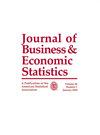顺序缩放稀疏因子回归
IF 2.9
2区 数学
Q1 ECONOMICS
引用次数: 3
摘要
多变量响应与预测因子之间的大规模关联分析具有重要的现实意义,在社交媒体营销和危机管理等现代商业应用中得到了体现。尽管方法发展迅速,但如何在一般噪声协方差结构下获得正则化参数自由调谐的可扩展估计量仍然不清楚。本文基于将低秩稀疏回归系数矩阵的恢复问题通过正则特征值分解分解为多个单变量响应稀疏回归的观点,提出了一种新的序列尺度稀疏因子回归方法(SESS)。它结合了顺序估计和缩放稀疏回归的优点,从而共享了两种方法继承的稀疏参数的可伸缩性和可调性。逐步凸公式、顺序因子回归框架和调优不敏感性使SESS在大数据应用中具有很高的可扩展性。对高维多响应回归也提供了全面的理论论证和新的见解。通过仿真研究和股票空头数据分析,验证了该方法的可扩展性和有效性。本文章由计算机程序翻译,如有差异,请以英文原文为准。
Sequential Scaled Sparse Factor Regression
Abstract Large-scale association analysis between multivariate responses and predictors is of great practical importance, as exemplified by modern business applications including social media marketing and crisis management. Despite the rapid methodological advances, how to obtain scalable estimators with free tuning of the regularization parameters remains unclear under general noise covariance structures. In this article, we develop a new methodology called sequential scaled sparse factor regression (SESS) based on a new viewpoint that the problem of recovering a jointly low-rank and sparse regression coefficient matrix can be decomposed into several univariate response sparse regressions through regular eigenvalue decomposition. It combines the strengths of sequential estimation and scaled sparse regression, thus sharing the scalability and the tuning free property for sparsity parameters inherited from the two approaches. The stepwise convex formulation, sequential factor regression framework, and tuning insensitiveness make SESS highly scalable for big data applications. Comprehensive theoretical justifications with new insights into high-dimensional multi-response regressions are also provided. We demonstrate the scalability and effectiveness of the proposed method by simulation studies and stock short interest data analysis.
求助全文
通过发布文献求助,成功后即可免费获取论文全文。
去求助
来源期刊

Journal of Business & Economic Statistics
数学-统计学与概率论
CiteScore
5.00
自引率
6.70%
发文量
98
审稿时长
>12 weeks
期刊介绍:
The Journal of Business and Economic Statistics (JBES) publishes a range of articles, primarily applied statistical analyses of microeconomic, macroeconomic, forecasting, business, and finance related topics. More general papers in statistics, econometrics, computation, simulation, or graphics are also appropriate if they are immediately applicable to the journal''s general topics of interest. Articles published in JBES contain significant results, high-quality methodological content, excellent exposition, and usually include a substantive empirical application.
 求助内容:
求助内容: 应助结果提醒方式:
应助结果提醒方式:


